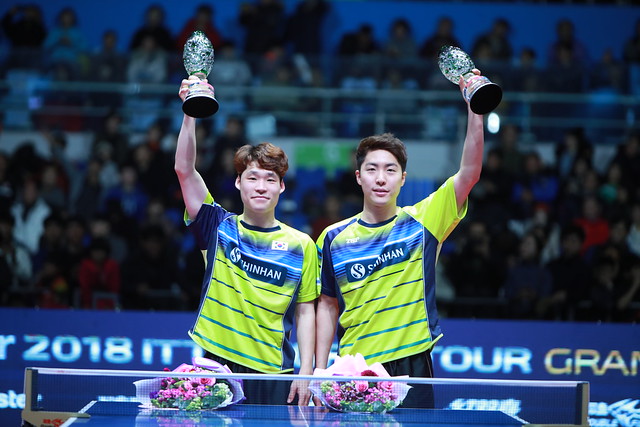by Ian Marshall, Editor
The age of Tomokazu Harimoto makes the win, one of the remarkable sporting feats of the year, add the manner in which he won and it makes the success even more mind blowing; he lost a total of just three games!
In addition to Lin Gaoyuan, in round one he dropped just one game in his win over Germany’s Patrick Franziska, the no.9 seed (11-7, 10-12, 11-8, 11-7, 11-7), before overcoming the host nation’s Jang Woojin, the no.5 seed, in a similar manner (12-10, 11-8, 11-7, 9-11, 11-9). Later he ousted Brazil’s Hugo Calderano, the no.7 seed, in straight games (11-7, 11-8, 11-8, 11-5) to reserve his place in the final.
Good form but in addition the homework had been completed; in the opening game of the final, Tomokazu Harimoto never gave Lin Gaoyuan an opportunity to unleash his electric quick-fire forehand; directing heavy top spin strokes towards the body of his opponent proved a winning formula. Level at 3-all, Lin Gaoyuan accelerated, he surrendered just one more point in securing the opening game, Lin Gaoyuan making errors from the backhand and when returning service.
One game to the good, in the second, Tomokazu Harimoto had chance after chance to double the advantage; at 10-9 he held game point, before having three further such chances, prior to Lin Gaoyuan succeeding on his one and only opportunity. Notably leading 12-10, Tomokazu Harimoto elected for “Time Out”; also quite unusually until Lin Gaoyuan secured the vital last point, from Tomokazu Harimoto leading 10-9 every point was won on the receive of service.
Chances missed, in the third game Tomokazu Harimoto responded; he won the first six points before eventually establishing a 10-3 lead. A total of seven game points, six were saved but Lin Gaoyuan was unable produce an act of escapology.
Similarly, in the fourth again it was Tomokazu Harimoto who made the better start; anticipating the moves of his adversary he established a 7-3 lead. Again Lin Gaoyuan mounted a recovery, he gained parity at 8-all, lost the next point and then trying to serve short to the forehand of Tomokazu Harimoto, served off the side of the table; two game points, the first was saved, not the second.
Now, belief increasing, the decibels from the throat of Tomokazu Harimoto ever more searing, he secured the first two points of the fifth game; understandably Lin Gaoyuan called “Time Out”. He recovered, at 9-7 he held a two point lead; he was not to gain a further success, the last two points being replicas. Lin Gaoyuan served short to the forehand, Tomokazu Harimoto moved across, returned with a backhand flick down the parallel to leave his adversary flat-footed.
Screams of delight from Tomokazu Harimoto; rather surprisingly it was the exact opposite, a quiet clench of the fist, the nervous tension released.
Furthermore, I give great credit to Tomokazu Harimoto for his behaviour; he did not roll around the floor in some demented manner on winning the last point, he courteously shook hands with Lin Gaoyuan, not a slap of the hands which I witness too often and then departed the arena.
Tomokazu Harimoto becomes the second Japanese player to win the Men’s Singles title at the Grand Finals; also he maintained his country’s success in the Korea Republic. In 2014 Jun Mizutani won in Bangkok, having four years earlier succeeded in Seoul, the only previous occasion when the Korea Republic has hosted the event.







